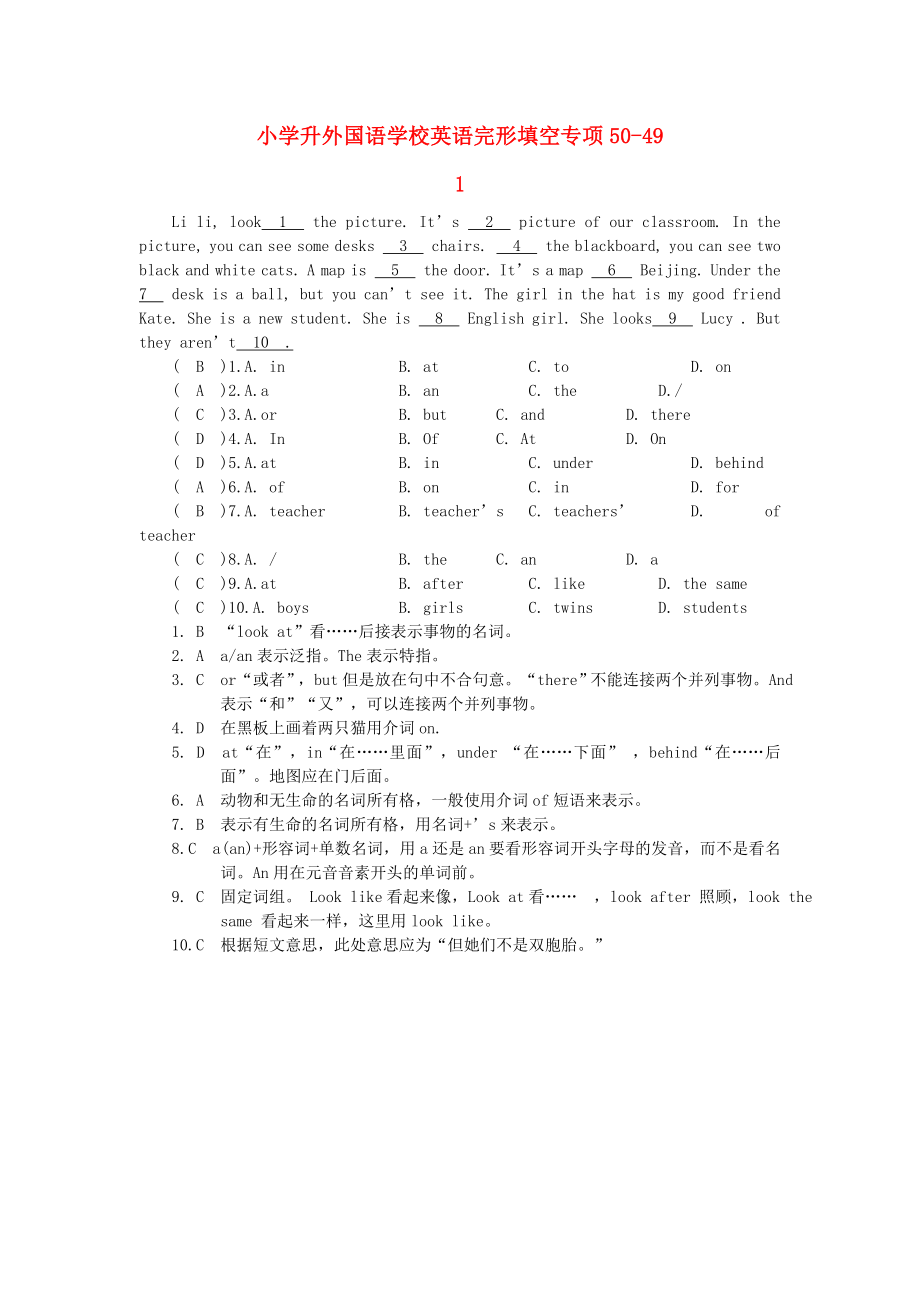《寧夏外國(guó)語(yǔ)學(xué)校小升初英語(yǔ)專(zhuān)項(xiàng)訓(xùn)練 完形填空49》由會(huì)員分享,可在線閱讀�,更多相關(guān)《寧夏外國(guó)語(yǔ)學(xué)校小升初英語(yǔ)專(zhuān)項(xiàng)訓(xùn)練 完形填空49(2頁(yè)珍藏版)》請(qǐng)?jiān)谘b配圖網(wǎng)上搜索。
1�、小學(xué)升外國(guó)語(yǔ)學(xué)校英語(yǔ)完形填空專(zhuān)項(xiàng)50-49
1
Li li, look 1 the picture. It’s 2 picture of our classroom. In the picture, you can see some desks 3 chairs. 4 the blackboard, you can see two black and white cats. A map is 5 the door. It’s a map 6 Beijing. Under the 7 desk is a ball, but you can
2、’t see it. The girl in the hat is my good friend Kate. She is a new student. She is 8 English girl. She looks 9 Lucy . But they aren’t 10 .
( B )1.A. in B. at C. to D. on
( A )2.A.a B. an C. the D./
( C )3.A.or B. but C. and D. there
( D )4.A. In B. Of C
3�、. At D. On
( D )5.A.at B. in C. under D. behind
( A )6.A. of B. on C. in D. for
( B )7.A. teacher B. teacher’s C. teachers’ D. of teacher
( C )8.A. / B. the C. an D. a
( C )9.A.at B. after C. like D. the same
( C )10.A. boys B. girls C. twins D.
4�、students
1. B “l(fā)ook at”看……后接表示事物的名詞。
2. A a/an表示泛指�。The表示特指。
3. C or“或者”�,but但是放在句中不合句意?!皌here”不能連接兩個(gè)并列事物�。And表示“和”“又”�,可以連接兩個(gè)并列事物。
4. D 在黑板上畫(huà)著兩只貓用介詞on.
5. D at“在”�,in“在……里面”,under “在……下面” �,behind“在……后面”。地圖應(yīng)在門(mén)后面�。
6. A 動(dòng)物和無(wú)生命的名詞所有格,一般使用介詞of短語(yǔ)來(lái)表示�。
7. B 表示有生命的名詞所有格,用名詞+’s來(lái)表示�。
8. C a (an)+形容詞
5、+單數(shù)名詞�,用a還是an要看形容詞開(kāi)頭字母的發(fā)音,而不是看名詞�。An用在元音音素開(kāi)頭的單詞前。
9. C 固定詞組�。 Look like看起來(lái)像,Look at看…… �,look after 照顧,look the same 看起來(lái)一樣�,這里用look like。
10.C 根據(jù)短文意思�,此處意思應(yīng)為“但她們不是雙胞胎?!?
2
The Turners 1 America. They are now 2 Beijing. This is their first visit to China. They are going
6�、to stay in China 3 three months. They want to visit some big cities and villages. They hope to learn 4 Chinese , too.
Mr turner is a driver. He 5 to drive in Beijing . Mrs Turner is a school teacher. She 6 a city school and a village school. 7 daughter is a middle school student. Sh
7�、e meets some Chinese students.
They 8 a lot of pictures in China . When they are back in America, they 9 show the pictures to their friends. They want 10 to know more about China.
( B )1.A.is from B. are from C. come to D. comes from
( D )2.A. of B. at C. on D. in
( C )3.A
8、. in B. on C. for D. from
( A )4.A. some B. many C. little D. no
( B )5.A. like B. likes C. want D. is wanting
( C )6.A. visit B. visiting C. is visiting D. are visiting
( D )7.A. His B. Her C. Your D. Their
( C )8.A. bring B. give C. take D. like
( D )9
9�、.A. go to B. is going to C. going to D. are going to
( B )10.A. American B. the American people C. Americas D. a America
1. B 定冠詞the +姓的復(fù)數(shù),表示××一個(gè)人�,××夫婦。其作主語(yǔ)時(shí)�,謂語(yǔ)動(dòng)詞應(yīng)用復(fù)數(shù)形式。Be from=come from表示“來(lái)自…”
2. D in+大地方�,表示“在……”
3. C for后面常接表示一段時(shí)間的詞。
4. A some 意為“一些”后面既可接不可數(shù)名詞�,也可接可數(shù)名詞的復(fù)數(shù)形式。Many只能接可
10�、數(shù)名詞的復(fù)數(shù)形式,little 后接不可數(shù)名詞但表示否定意義�。no也表示否定,根據(jù)上文,用some合適�。
5. B 本句主語(yǔ)He為單數(shù)第三人稱(chēng)。謂語(yǔ)要用動(dòng)詞的第三人稱(chēng)單數(shù)形式�。
6. C 本句應(yīng)用現(xiàn)在進(jìn)行時(shí),其結(jié)構(gòu)是:主語(yǔ)+be+V-ing.
7. D 這里用Their指代Mr Turner 和Mrs Turner兩人�。
8. C take photos = take pictures意為照相�。
9. D be going to +V原形,表示按計(jì)劃或打算要做某事�。
10.B 此處表示特指�,應(yīng)加定冠詞the , the American people意為“美國(guó)人們”�。
 寧夏外國(guó)語(yǔ)學(xué)校小升初英語(yǔ)專(zhuān)項(xiàng)訓(xùn)練 完形填空49
寧夏外國(guó)語(yǔ)學(xué)校小升初英語(yǔ)專(zhuān)項(xiàng)訓(xùn)練 完形填空49

